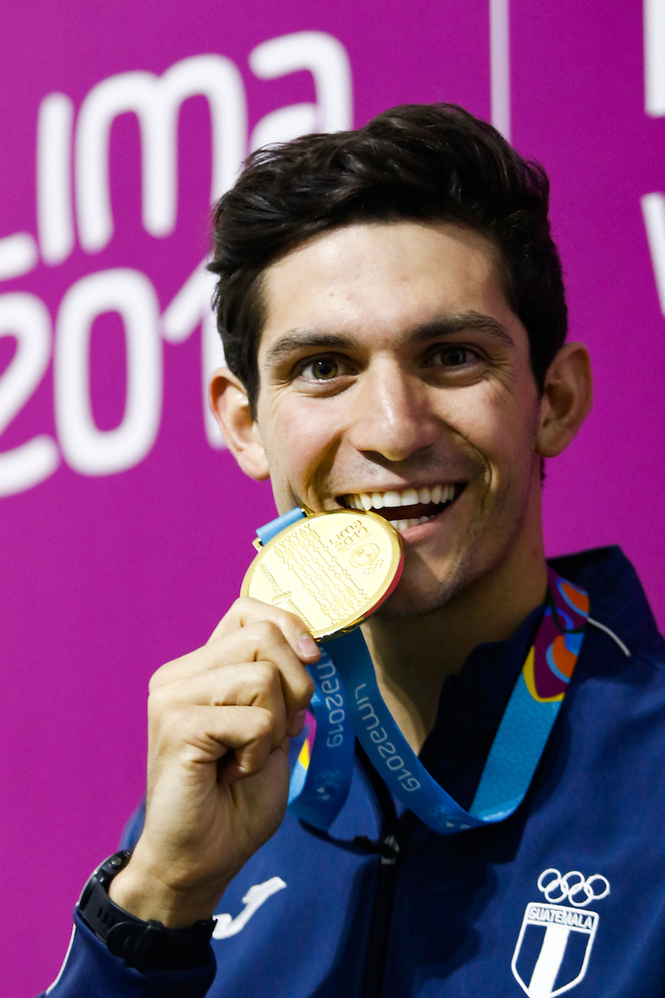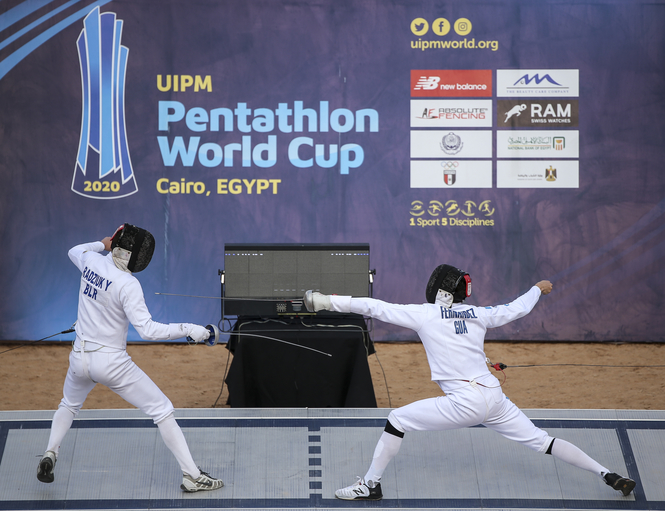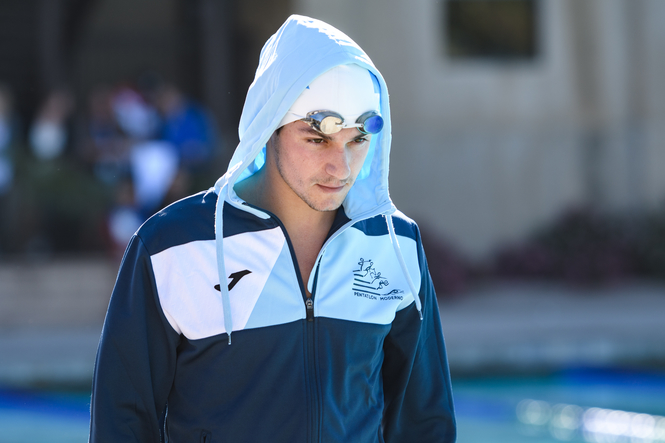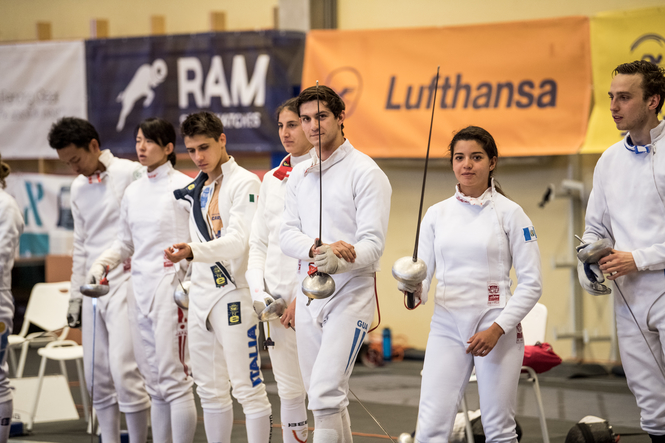Road to Tokyo: Fernandez (GUA) on fair play, his father and the fire within
Charles Fernandez of Guatemala is the kind of athlete who always looks right at home on the top of the podium.
The 24-year-old has a strong track record of winning individual gold medals that stretches right back to the NORCEA Junior Championships in Santo Domingo (DOM), when he was 17. Two years later he sprang a real surprise by winning the Modern Pentathlon at the Pan American Games in Toronto (CAN).
In 2016, shortly after his debut Olympics, Fernandez (GUA) became UIPM world junior champion, and since then he has won gold at the 2018 Central American Caribbean Games in Cali (COL) and snared a second Pan American Games title in Lima (PER) in 2019.
A natural ambassador who served as an Athlete Role Model at the Buenos Aires 2018 Youth Olympic Games, he also put his communication skills to use as MC during the UIPM 2019 Pentathlon and Laser Run World Championships in Budapest (HUN) in 2019 while sitting out the competition through injury.
Fernandez (GUA), a devout Christian whose family runs an evangelical ministry, was born on Christmas Day. Is he destined to be part of an Olympic miracle in Tokyo or Paris?
Q: How did it feel in 2019 when you won gold at the Pan American Games in Lima (PER) and secured a qualification place for the Tokyo Olympics?
A: Being able to win the Pan American Games a second time in a row was such a breakthrough point in my career. Being able to overcome a lot of obstacles and responsibilities in my life – such as finishing school with two degrees and overcoming a big mental battle with myself at the beginning of 2019 – just showed me that when you work hard and give everything you have, it’ll be worth it in the long run.
Winning the Pan American Games and securing my place for Tokyo was such a huge celebration for everyone who had continued to believe in me through the years after Rio 2016, and a huge motivating boost to continue working hard and never let that Olympic dream fade away. I couldn’t have been happier throughout the span of my sports career after crossing that finish line.

Q: You finished a very creditable 15th at the Rio 2016 Olympic Games? How do you reflect on that now?
A: I couldn’t have been more pleased with my performance at my first Olympic Games. Considering the fact that I was one of the youngest athletes on the field at only 20, being a junior athlete and having the worst ride of my international career in the Riding discipline, after I’d been in a high position, the way I worked my way up from the bottom 20 into 15th place in the Laser Run showed me a lot of mental maturity and valuable lessons that I have applied these past few years since that day.
Rio was only the beginning of what I knew could be possible in the future heading towards the Olympic Games in Tokyo.
Q: If selected to compete for Guatemala at Tokyo 2020 in 2021, will you prepare any differently?
A: I would say there is going to be a night-and-day difference between my preparation for Tokyo and how I prepared in Rio. My preparation for Rio was very raw and based on strict physical training without much thought into the mental or technical aspect of being a high-performance athlete at that time. That does not mean that what I did for Rio was undervaluing my potential, but rather training myself to endure the harsh reality of training hard and not shying away from hard work.
I give a lot of credit to my former head coach for teaching me those qualities because now I can look at other important aspects of high-performance sport which includes the psychological part and technical part of pentathlon, which gives me so much more room to grow.
That is going to be the determining difference between Rio and Tokyo. I have a whole support team dedicated to helping me grow in the mental and technical side of sport, which add a lot of value to who I am as an athlete for the next Games.
Q: What do you think about the Olympics being postponed until 2021?
A: When the Olympics were officially postponed until 2021, I just remember feeling a big relief after living several weeks with uncertainty and stress due to the unknown about what was going to happen.
I believe the postponement of the Games was the best decision that could’ve been taken since this gives all athletes and countries a fair chance to shift their focus on personal health and safety during these hard times. I believe all athletes should have fair and equal circumstances to train, compete and prepare themselves to the best of their ability for such a prestigious event.

Q: How have you been keeping up your physical and mental health during the Coronavirus crisis?
A: It took a while to adjust to a new system of training once everything went into lockdown. With the diligent work of our coaches and the fast adaptation of the national team we were able to create an effective training system that enables us to train in our homes with limited resources and still stay physically fit through these unknown times.
This new training system entails athletes and coaches to attend Zoom meetings every day of the week for two hours and do different training sessions related to all the disciplines of Pentathlon. Monitoring of training through online platforms using GPS running watches has been a new way of implementing technology into our training so our coaches can track how we feel and the effect that the intensity of our workouts has on each individual.
The mental aspect of adjusting to the new norm and accepting the reality of what is happening around the world was the most difficult to adjust to, because it was not just the Olympic Games being postponed that affected me – it was also my plans for after the Olympics.
It is difficult to accept that we have no control over what happens around us but we need to realize that the faster we adjust to changing circumstances in a positive way, the faster we can overcome obstacles and work through challenging times effectively. This type of mentality has not only been applied to my athletic career but also in my personal life.
The process of working into that mindset was the challenging part, making sure my mental health was stable and healthy. I encourage others to really dig deep into the importance of having a healthy mindset and applying those positive attributes to your daily lifestyle.
Q: What positive things have you seen?
A: One of the most positive things I have seen during these times are the people who have had the opportunity to spend more time with their family and loved ones. If I speak for myself, my life is always on the go. I am always all over the place doing many things at once and this doesn’t allow me to settle down, rest and take a moment to relax.
As human beings, we are not designed to live like robots and sometimes we forget that we need time for ourselves for our own wellbeing. Having the time now to do things that I have always wanted to do, or learn something I have always wanted to learn whilst having time for family and friends – while not having to worry about the hectic nature of life – has been the most positive thing I have experienced during this pandemic and am very thankful to have had the opportunity.
Q: When, and why, did you take up the Modern Pentathlon?
A: My dad, Carlos Fernandez, was one of the first Modern Pentathlon athletes in Guatemala many years ago and had the opportunity to compete in several Pentathlon World Cups and regional championships. Fast-forward to many years later he received a phone call from one of his former teammates inviting him over to compete in a national Masters competition against his former teammates. My father accepted the invitation to compete and invited me to come along with him.
The coach at the time, Marian Gheorghe, who is my current head coach, asked me if I wanted to try the sport and it was in January 2010 that I competed in my first national competition. I did Pentathlon casually for two years and it wasn’t until watching the London 2012 Olympics that the Olympic dream sparked inside of me and that is when I took the decision to pursue my dream professionally.
Before doing Modern Pentathlon I was a triathlete and a runner. When I tried Pentathlon out for the first time there was something about the diversity of all the sports that made it attractive. Ironically triathlon was very difficult for me and I did not enjoy it with a passion, but switching to five sports really caught my attention and to my surprise I had enough talent in all the sports to catch on to it quickly.
Within a few months of doing Pentathlon I found myself significantly improving at a fast pace while enjoying it at the same time. I guess the factors of my dad doing pentathlon and the enjoyment and fast adaptation to the sport are what made me take it up in a serious way.

Q: What motivates you in training?
A: The number one thing that motivates me in training is the people that have always believed in me since I was a nobody in the sport, and the whole country of Guatemala. I have such a strong passion for the people of my country.
Although Guatemala is small and not well known around the world, I have a passion to show the world who we are as people and what we are capable of. When you experience success in the small things it always makes me wanting more and wanting to bring joy to the people who support me.
When you achieve the goals that you have set for yourself there’s no greater feeling than seeing your family, friends and a whole country rejoice together, because at the end of all of this it’s about teamwork – each individual counts. This motivates me.
Q: Describe yourself as an athlete in three words.
A: Passionate, fierce, strong
Q: Who are your role models in sport, and in life?
A: I would say one of my role models in sport is a fellow friend and competitor, Arthur Lanigan-O’Keeffe from Ireland. Arthur has always been a friend to me since I entered the sport internationally and has always looked out for me by giving me tips and advice that he has learned over the years. I have had the opportunity to train alongside him and I have much respect for him and what he does in and out of sport.
My life role model is definitely my father. He never came from much as a child and suffered a lot of hardships throughout his life, but through the trust he had in God and the desire to create a better life for himself he came out as someone who has inspired hundreds of people, someone who serves his country and his own people who live in extreme poverty, and someone who has impacted my life in a way that I will never be able to put into words.
If it wasn’t for my father and his story I would not be where I am at today, as a professional athlete or as an individual. I owe much to him and his impact.
Q: What is your ultimate ambition in Modern Pentathlon?
A: My ultimate ambition in Modern Pentathlon is to be a positive impact to the people around me in the sport. I guess one would say that an ultimate ambition in Modern Pentathlon would be to be a world champion or an Olympic champion and although those achievements are very respectable, titles are not as important to me as representing my country and myself in the best possible way.
I strive to bring a change to the places around me and that includes being involved in different areas that sport has to offer. Whether it’s competing in Modern Pentathlon, being part of the UIPM Athletes’ Committee or being involved in the Olympic movement, my ultimate goal is to bring change in a positive way and my journey with Modern Pentathlon has allowed me to do that at a national and international level.




